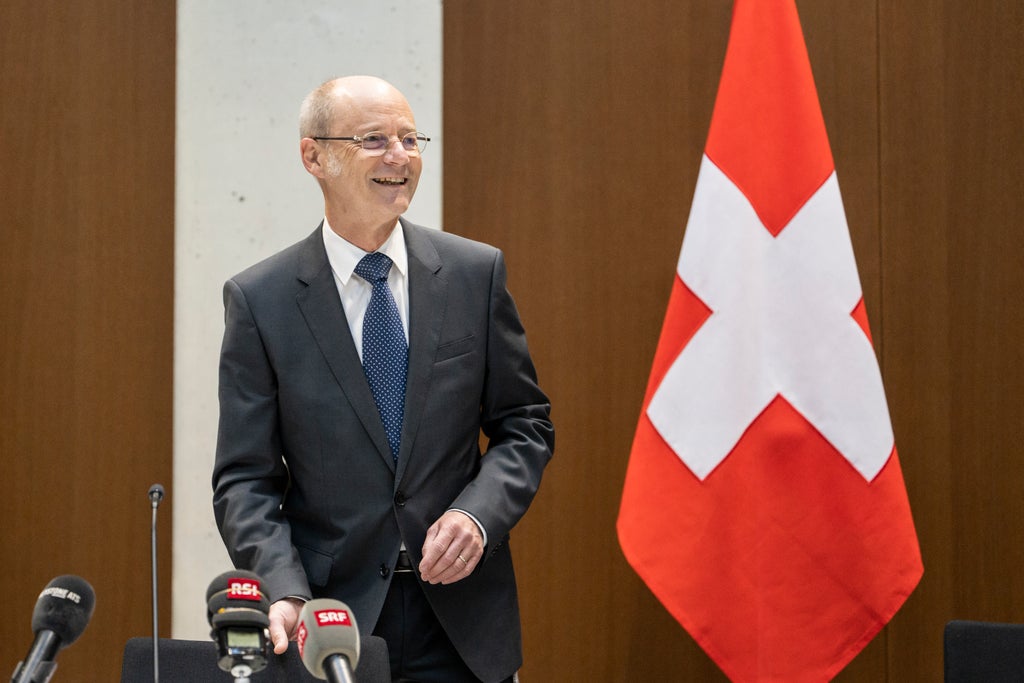
Switzerland’s new attorney general is pushing parliament to give his office more tools to fight white-collar crime.
The country's maximum financial penalty on corporations for wrongdoing is just 5 million Swiss francs ($5 million), and that's “ridiculous,” Stefan Blaettler said Friday in an interview on the sidelines of his first press conference as attorney general.
Not yet four months into the job, the former police chief of Bern laid out his ambitions to fight money laundering, terrorism and corruption in Switzerland and to contribute to international justice efforts in the wake of Russia’s war in Ukraine.
Blaettler said it's been an uphill battle to convince Swiss lawmakers to adopt tougher penalties for wrongdoers.
“This week, I was in parliament and told them, ‘You know what you are doing? You can condemn (convict) a bank -- a global working bank -- and the maximum fine is five million? It’s ridiculous’,” he said. “That’s a third of the pay of a manager.”
Speaking in English, Blaettler, 62, said he'd like the legal means afforded to counterparts in countries like the U.S. and Britain to spell out to corporations that “‘if ever you want to continue your activity, this is the fine, and these are the rules for the coming 10 years’.”
Blaettler also alluded to what anti-corruption groups have decried as an abortive effort in parliament last year to tighten the rules governing the activities of “third parties,” such as lawyers who set up and administer huge funds in Switzerland, largely outside of any strict legal boundaries.
He said Switzerland's image was at stake.
“Reputation means business," said Blaettler. “And this country wants to make (do) business, but we want to make sure that the business is correct ... (and) plays by the rules.”
“But give us also the instruments which give us the possibility to combat those who won’t play by the rules,” he said.
As for the war in Ukraine, Blaettler's office last month announced the creation of a task force charged with interviewing Ukrainian refugees and working with international and European prosecutors.
The attorney general said Friday he had a “duty” to help gather information from refugees and to build case files that could be used to bring to justice any war criminals who might come to Switzerland.
“I’m interested in the second, the third level,” Blaettler said. “Every army commander who launches the missiles against the churches and schools and hospitals is a potential war criminal. So as a potential war criminal, that means if he sets foot in Switzerland, we will start an inquiry.”
The Swiss government, straying somewhat from its long-touted neutrality, has lined up with European Union sanctions against Russian oligarchs, political elites, and companies.
The Swiss Bankers Association has estimated that the assets of Russian clients deposited in Swizerland's banks total 150-200 billion Swiss francs (about $160-$215 billion), making the country a key repository of Russian money abroad.
Blaettler said his office is gearing up to work with Eurojust, an EU agency that works to fight crime, and the International Criminal Court, whose prosecutor has launched a probe into possible war crimes in Ukraine.
His office has suspended legal cooperation with Russian counterparts, but Swiss authorities have been in contact with Ukrainian law enforcement, notably police.
Swiss federal prosecutors have been in touch with Ukrainian counterparts only “indirectly” so far, through Eurojust, Blaettler said.
“They are struggling for survival,” he said. “They are not struggling for getting back $100 million now. That will come.”







